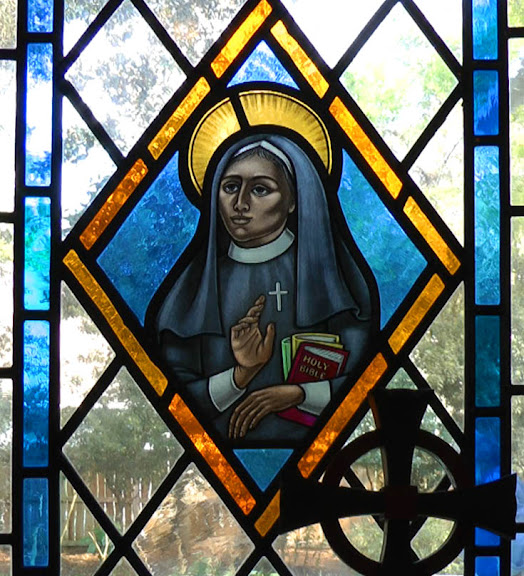Readings for the feast of Anna Ellison Butler Alexander, Friday, September 24, 2021: Psalm 78; Deuteronomy 6:4-9; Matthew 11:25-30
Our Gospel reading for the feast of Deaconess Anna Ellison Butler Alexander includes Jesus telling the disciples that his yoke is easy and his burden is light. Deaconess Anna’s life was one of a heavy yoke, indeed, yet through her Jesus lifted not only her burdens, but the burdens of others.
The date of Anna’s birth is unclear, but believed to be sometime around 1865, on St. Simons Island, Georgia, to former slaves. (She most likely fudged some dates on her birth certificate and church documents to conceal the fact she was working well into old age.) Her family story was not an unusual one in some ways, but unusual in others. Her mother’s birth was the result of Anna’s grandmother being raped by a white overseer. Her father had been the personal house servant of his master, and had learned to read by a combination of self-teaching and some help from his master’s wife, despite the prohibition in Georgia for whites to teach slaves to read. He instilled that love of education into Anna, and she became a teacher herself, sometimes traveling as far as forty miles by boat and by foot to some of her teaching posts. Over time she concentrated on working in Episcopal schools because she felt the quality of the education children of former slaves received there was better.
Shortly after the Civil War, Anna’s family moved to Pennick, GA, where her father used his skills as a craftsman to earn a living, in addition to turning a poor piece of ground into a working farm. Anna never forgot her parents’ legacy of hard work and generosity. She was definitely a woman who burned the candle at both ends – establishing an Episcopal mission in Pennick, where newly freed families could learn practical life skills, and teaching at a school in Darien, founded by St. Cyprian’s Episcopal Church. She made countless 40 mile trips between Pennick and Darien by boat and foot.
Her efforts in various locales in the Diocese of Georgia, in the latter part of the 19th century and turn of the 20th century did not go unnoticed by Georgia bishop Cleland Kinloch Nelson. Despite substandard conditions, little money, and sometimes with only the grace of the Holy Spirit in her pocket, Anna was able to help improve the living conditions of many rural Georgians of color, despite being surrounded by Jim Crow culture. He set her apart as a deaconess in 1907 and she worked tirelessly in the Altamaha River area of Georgia for the rest of her life.
Sadly, the diocese of Georgia also split in 1907, and Bishop Nelson chose to affiliate with the new Diocese of Atlanta. His successor, Bishop Fredrick Focke Reese, banned African-Americans from church government within the diocese, and essentially eliminated diocesan support to African-American missions. Undaunted and unbroken, Anna Alexander continued to seek support for her work from outside organizations, including the Episcopal Board of Missions. Her hardscrabble community managed to weather the poor crop years of the 1920s and the Great Depression.
Eventually, although Bishop Reese never entirely abandoned the Jim Crow culture, he did come around to some degree and acknowledge Anna’s contributions to the church. Still, her story was pockmarked with sad ironies. Every summer in the last decade of her life, she would supplement her meager income by working as camp cook at Camp Reese, the diocesan summer camp. Every summer, she would bring several young African-American children and teens, ostensibly to assist at the camp (the diocese still did not allow black campers), but giving them free time to explore and roam the area. In meticulous accounts she left of her mission work, we see that time and time again, she managed to provide for people with a wide variety and scope of needs with, at the very least, enough to keep them going–and, at times, figuring out ways to circumvent Jim Crow. When she died in 1947, she was buried on the grounds of Camp Reese. When the camp closed and was sold, her remains were moved to Good Shepherd Church in Pennick and re-interred. Anna’s legacy of teaching continues long after her death – in 2018 she received the coveted Golden Halo as the winner of Lent Madness!
For Anna Alexander’s entire life, the deck was stacked against her. Yet she still provided the Good News of Christ to countless others, whether that Good News was in the form of prayer or a sack of cornmeal. How might we channel her resiliency as we move closer to the post-pandemic church?
Maria Evans splits her week between being a pathologist and laboratory director in Kirksville, MO, and gratefully serving in the Episcopal Diocese of Missouri , presently enjoying being a “free range priest” until her next interim assignment.

